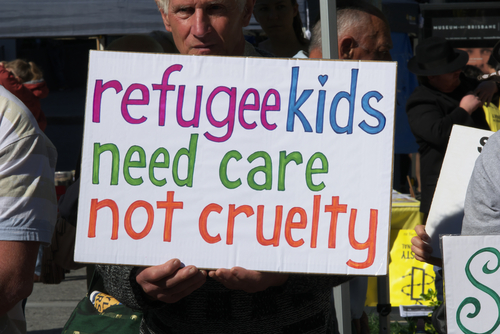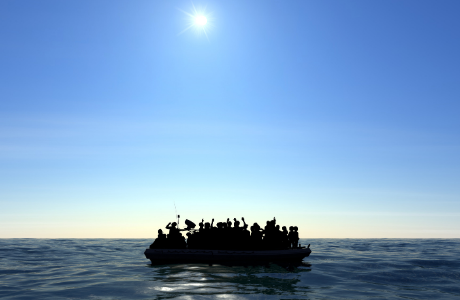It was just a couple of months ago when Home Affairs Minister Peter Dutton said: “Australians must guard against compassion towards refugees as it could undo the government’s hard-fought success in discouraging people smugglers.” [1] I believe Mr Dutton’s statement reflects a faulty logic. If the boats were going to start again because of compassion, they would have started when asylum seekers moved to the United States, or when kindness was finally shown to people who were in desperate need of medical help. The boat turn back policy seems quite sufficient to stop those who are attempting to smuggle drugs, weapons and people.
I have never viewed compassion as something I need to guard myself against. Compassion is required for the people held in Nauru, PNG, and other detention centres. People sometimes ask how a holocaust could happen. It’s quite simple – demonise a group of people making them “the problem” or somehow “less than human”. From there it’s easy to treat them without compassion, in fact, we’d need to guard against compassion. Such is the case for the asylum seekers held in Australian detention centres because we all know they are “boat people”, “economic refugees”, or “terrorists” who are trying to subvert our way of life.
What about children?
Right now, there are several children on Nauru who are severely or critically unwell. Some of them are self-harming and suicidal. Consider:
- A 12-year-old girl who was taken to Nauru hospital after attempting to set herself on fire, an incident that was witnessed by other children. She has made multiple attempts recently to end her life. Several adults have also set themselves on fire on Nauru, one fatally, and some children have attempted to kill themselves by that method. [2]
- Or the 17-year-old girl who is being treated inside the regional processing centre after refusing all food, fluid and medical treatment. Three doctors have diagnosed her with a major depressive disorder and “resignation syndrome”.[3] A person who knows the girl said she had previously been one of the brightest and most articulate of the refugee children. “Before she got sick, she was the best-performing student. She had a dream to be a doctor in Australia and to help others. Now, she is on food-and-fluid refusal and begging to die as death is better than Nauru.” [4]
- Then there is the 12-year-old boy who had been refusing to eat for 20 days and was finally flown to Brisbane last Tuesday. The boy weighed 36kg and is unable to stand. His mother and sister are being held in detention in Brisbane but are allowed to visit him.
- There’s a 14-year-old boy with muscle wastage so severe he may never walk normally again.
- And a two-year-old child whose parents are too unwell to care for him.
I read these stories and find it so hard to guard against compassion, but I’m trying hard Mr Dutton, I really am! This week, Buzzfeed released the personal testimonies of one child and two young adult detainees on Nauru. I encourage you to listen to their stories and share them with others.[5]
What about families?
The descriptions of families being torn apart and devastated are heart-wrenching. For example, an air ambulance arrived on Nauru recently to take a gravely ill 15-year-old refugee boy to Taiwan. After protests from his family (about being separated, possibly permanently) and concerns over his fitness to fly, the plane left without a patient. International Health & Medical Services (IHMS) staff have made frequent requests for the boy to be moved to a place where higher-level care is available. The Australian Border Force maintains the boy and his family have refused treatment, citing the plane being turned away at the cost of more than $100,000. If you were in this family’s position, what would you do? I would feel devastated if one of my children were seriously ill and was being moved to a developing country without Christie and myself; a country where she wouldn’t know anyone and wouldn’t understand the language. But there I am getting all compassionate again.
What about the cost?
This year at least 14 legal challenges have been brought before the federal court seeking immediate orders that children be moved from Nauru to a place where higher-level care is available, almost invariably Australia. The government has opposed each challenge, but each has been successful: every case has either been conceded by the government at the courthouse door or resulted in an order from the bench that children be moved immediately, a process that is costing hundreds of thousands of dollars all in the name of guarding against compassion.
These are just a few examples of the extreme suffering being experienced by the 117 children (and their families) still on Nauru, and all but a handful have already been recognised as legitimate refugees. Our government should be very concerned about the upcoming Pacific Islands Forum beginning on September 1. “The Australian and Nauru governments are going to extraordinary efforts to cover up the abuse of refugees and asylum seekers on Nauru. Demolishing the tents and providing new cars to drive around in, won’t hide the reality of the abuse that Nauru is now internationally identified with.” [6]
I hope the media representatives that get to Nauru to cover the Forum will also be allowed to report honestly on the devastating plight of asylum seekers. May they NOT guard against compassion.
Please join Christie and me in advocating to get the Kids off Nauru. Go to Kids Off Nauru to find out how you can make a difference, and use #kidsoffnauru in all social media posts. Thank you for your compassion.
[1] https://www.sbs.com.au/news/compassion-can-undo-efforts-against-people-smugglers-dutton?cid=newsapp:socialshare:copylink
[2] https://www.theguardian.com/australia-news/2018/aug/23/nauru-self-harm-contagion-as-12-year-old-refugee-tries-to-set-herself-alight
[3] Children suffering resignation syndrome effectively withdraw from life – refusing to eat, drink, toilet, leave their beds, speak, or even open their eyes. They are sometimes completely unresponsive to stimuli. Resignation syndrome is a very serious state of withdrawal that traumatised children can go through when they are “overwhelmed by stress.”
[4] https://www.buzzfeed.com/lanesainty/australias-child-refugees-are-being-diagnosed-with-swedens?utm_term=.rf2qvVoW0#.oq4YNDa3p
[5] https://www.buzzfeed.com/lanesainty/young-refugees-nauru-mental-health-crisis?utm_source=dynamic&utm_campaign=bfsharetwitter&utm_term=.xdoa6xQjX#.jkB2kZ0vB
[6] https://www.sbs.com.au/news/mouldy-nauru-tents-replaced-ahead-of-pacific-islands-forum-in-cover-up-refugee-activists





